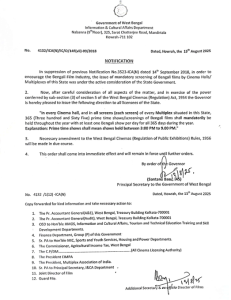Synopsis:
Bengali Pride takes center stage as the West Bengal government orders cinema halls and multiplexes to screen Bengali films in prime time every day of the year, sparking debate over cultural promotion and economic viability.
By Dr. Mohammad Farooque |
Qalam Times News Network | Kolkata | August 13, 2025
Bengali Pride Drives New Cinema Rule
Bengali Pride has become the rallying cry for the Mamata Banerjee-led West Bengal government as it issues a sweeping new directive for the state’s entertainment industry. Under an order dated August 13, 2025, all cinema halls and every screen of multiplexes must screen at least one Bengali film daily during prime time—defined as 3:00 PM to 9:00 PM—for all 365 days of the year.

The notification, signed by Principal Secretary Santanu Basu, makes it clear: even if a multiplex has multiple screens, each one must host a Bengali movie in its prime slot every day. The mandate takes immediate effect and will remain in force until further notice, with amendments planned to the West Bengal Cinemas (Regulation of Public Exhibitions) Rules, 1956, to formalise the requirement.
From 120 Days to 365: A Dramatic Expansion
This is not the first time the state has linked Bengali Pride to cinema policy. In 2018, the government had instructed theatres to show at least one Bengali movie for 120 days annually during prime hours. The new rule, however, extends that commitment across the entire year, removing any seasonal flexibility for cinema operators.
Officials argue the move will boost the visibility of regional films, ensuring that Bengali cinema secures equitable showtime against the dominance of Bollywood and international releases. Critics, however, warn that the policy could backfire—forcing screenings regardless of audience interest or film availability, and putting both theatre owners and the Bengali film industry under economic and creative strain.
Industry Concerns Over Sustainability
Theatre owners have already flagged potential financial losses, especially in districts with a smaller Bengali-speaking audience. Filling daily prime-time slots across hundreds of screens could also overwhelm filmmakers, who may struggle to produce enough high-quality content to sustain year-round demand. Industry analysts caution that this could lead to a flood of subpar films, alienating viewers rather than attracting them.
Despite these concerns, the state government is doubling down, unveiling plans to set up mini-cinemas across the state to further promote Bengali films.
Political Timing and the Language Debate
The announcement comes amid heightened political activity around Bengali Pride. Just a day earlier, on August 12, Trinamool Congress MPs staged a demonstration outside Parliament’s Makar Dwar, protesting what they called an “insult to Bengal.” The protest featured prominent figures such as Yusuf Pathan, MP from Murshidabad, and Jaya Bachchan of the Samajwadi Party.
Carrying placards reading “Stop Insulting Bengal” and portraits of cultural icons like Rabindranath Tagore and Subhas Chandra Bose, the MPs linked the cultural preservation drive to a broader ‘Bhasha Andolan’—a movement to protect and elevate the Bengali language and heritage in national discourse.
For the Mamata government, this cinema directive is more than a cultural policy—it is a political statement. Whether it will strengthen Bengali Pride or burden an already pressured entertainment sector remains to be seen.







